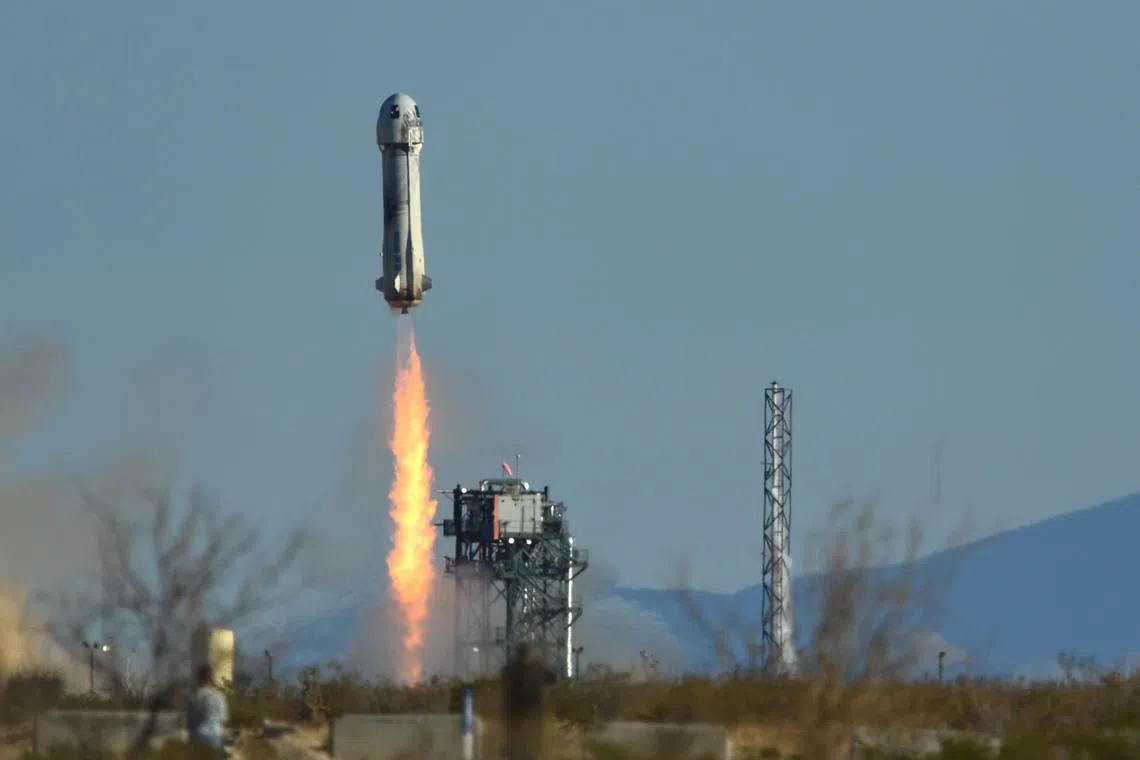Ground issue delays Blue Origin’s New Shepard rocket launch
Sign up now: Get ST's newsletters delivered to your inbox

A Blue Origin New Shepard rocket launches from Launch Site One in West Texas north of Van Horn in March 2022.
PHOTO: AFP
WASHINGTON - Jeff Bezos’ space company Blue Origin called off a return-to-flight mission with its suborbital New Shepard rocket in Texas over what it described as a ground system issue encountered during preparations for liftoff, the company said.
“We’re scrubbing #NS24 today due to a ground system issue the team is troubleshooting,” Blue Origin wrote on social network X, formally Twitter. “We’ll provide a new launch target for this week soon.”
New Shepard, the company’s only active rocket that can carry humans and cargo on short trips to and from the brim of space, was scheduled to launch at 9:30 a.m. CT (1530 GMT) on Dec 18 for the first time since a mission failure in 2022 triggered a 15-month grounding.
No humans, but 33 research experiments, were to be on board for the mission, named NS24 for what would have been its 24th flight. A ground system issue typically concerns a snag with the rocket’s launch pad, rather than the rocket itself.
On Sept 12, 2022, a Blue Origin rocket became engulfed in flames shortly after launch.
The accident prompted a year-long probe by the Federal Aviation Administration (FAA), which found it was caused by the failure of an engine nozzle that experienced higher-than-expected engine operating temperatures.
The regulator issued a set of corrective actions Blue Origin had to undertake before it could resume flying, including the redesign of certain engine parts.
The FAA confirmed on Dec 17 it had approved Blue Origin’s application to fly again.
In all, Blue Origin has flown six crewed flights – some passengers were paying customers and others flew as guests – since July 2021, when Mr Bezos himself took part in the first flight.
While Blue Origin has been grounded, rival Virgin Galactic, the company founded by British billionaire Richard Branson, has pressed on, flying five commercial flights this year.
The two companies compete in the emerging space tourism sector, offering a few minutes of weightlessness in “suborbital” space.
While Blue Origin launches a small rocket vertically, Virgin Galactic uses a large carrier plane to gain altitude and then drop off a smaller rocket-powered spaceplane that completes the journey to space.
In both cases, passengers enjoy a few minutes of weightlessness and can view the curvature of the Earth through large windows.
Virgin Galactic tickets were sold for between US$200,000-US$450,000 (S$266,437-S$599,483), while Blue Origin doesn’t disclose its ticket prices publicly.
Blue Origin is also developing a heavy rocket called New Glenn, with the maiden flight planned for 2024.
This rocket, which measures 98m high, is designed to take a payload of as much as 45 metric tons into low Earth orbit. REUTERS, AFP


